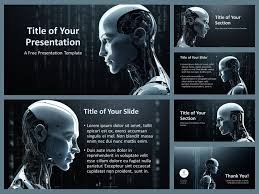Introduction
Creating office presentations can be time-consuming and challenging, especially when striving for engaging visuals, clear messaging, and professional formatting. AI-powered tools have revolutionized this process, enabling professionals to generate high-quality slides quickly and efficiently. In this blog, we’ll explore how AI can streamline presentation creation with real-world case studies and examples.

Benefits of AI in Presentation Creation
1. Automated Design and Layouts
AI-powered tools like Microsoft PowerPoint Designer, Beautiful.ai, and Canva AI can automatically generate aesthetically pleasing slides. These tools analyze content and suggest the best layouts, fonts, and color schemes, ensuring consistency and professionalism.
Case Study: Marketing Agency Transformation
A digital marketing agency struggled with inconsistent branding in their slides. After adopting Beautiful.ai, they streamlined their presentation process. The AI tool suggested cohesive templates, ensuring that every deck aligned with the company’s branding guidelines. The result was a 40% reduction in time spent on design and improved client engagement.
2. Content Generation and Optimization
AI tools like ChatGPT, Tome, and Jasper AI can generate text, summarize key points, and optimize messaging based on audience analysis. These tools help professionals create concise, engaging, and informative slides with minimal effort.
Example: Sales Pitch Enhancement
A sales team used ChatGPT to refine their pitch deck. By analyzing customer data, the AI tool suggested tailored messaging that resonated with potential clients. This led to a 20% increase in conversion rates, as the slides became more persuasive and data-driven.
3. Data Visualization and Insights
AI-driven platforms like Tableau AI and Google Data Studio transform raw data into compelling visuals, such as charts, graphs, and infographics. These tools make complex information easier to understand and more engaging for audiences.
Case Study: Finance Firm’s Data Storytelling
A financial firm integrated Tableau AI into its reporting presentations. The tool automatically generated insightful graphs based on real-time data, helping executives make data-driven decisions faster. Employees reported a 30% improvement in understanding financial reports.
4. Voice and Speech Assistance
AI-powered speech tools like Synthesia, Lumen5, and Google Slides AI Speaker Coach help professionals add voiceovers and practice their delivery. These tools can convert text into natural-sounding speech and offer feedback on tone, pacing, and clarity.
Example: AI-Powered Training Slides
An HR team used Synthesia to create AI-generated video presentations for onboarding new employees. This reduced training time by 50% and improved engagement, as employees could access visually appealing, narrated presentations at their convenience.
5. Collaboration and Real-Time Editing
AI tools integrated into platforms like Google Slides, PowerPoint AI Co-Pilot, and Notion AI allow multiple team members to edit and refine slides in real-time. AI assists by suggesting edits, detecting errors, and improving slide readability.
Case Study: Remote Team Productivity Boost
A multinational corporation with remote teams leveraged AI-powered Google Slides suggestions. The AI tool flagged unclear points and suggested refinements, leading to a 25% increase in meeting efficiency and reduced revision cycles.
Future of AI in Office Presentations
As AI evolves, we can expect:
More intuitive design automation that adapts to personal preferences.
Voice-powered presentation creation, where AI listens to spoken ideas and generates slides instantly.
Advanced audience engagement analytics, providing real-time feedback on presentation effectiveness.
AI-Generated 3D and Interactive Slides – AI will enable users to create immersive 3D presentations with augmented reality (AR) and virtual reality (VR) components, making Slides more engaging and interactive.
Real-Time Audience Analytics – AI will analyze audience reactions and engagement in real-time, providing instant feedback to presenters for on-the-spot adjustments.
Smart Slides Assistants – AI-powered assistants will suggest improvements, transitions, and real-time modifications while you present.
Automated Presentation Summarization – AI will generate concise summaries for meeting recaps and follow-ups, ensuring all key points are documented effectively.
Conclusion
AI has transformed office presentations by automating design, optimizing content, visualizing data, enhancing speech delivery, and streamlining collaboration. Businesses and professionals leveraging AI-driven tools can create compelling presentations faster, improving productivity and engagement. If you’re looking to enhance your presentation game, now is the time to explore AI-powered solutions!

